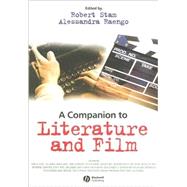
A Companion to Literature and Film
by Stam, Robert; Raengo, Alessandra-

This Item Qualifies for Free Shipping!*
*Excludes marketplace orders.
Buy New
Rent Textbook
Rent Digital
Used Textbook
We're Sorry
Sold Out
How Marketplace Works:
- This item is offered by an independent seller and not shipped from our warehouse
- Item details like edition and cover design may differ from our description; see seller's comments before ordering.
- Sellers much confirm and ship within two business days; otherwise, the order will be cancelled and refunded.
- Marketplace purchases cannot be returned to eCampus.com. Contact the seller directly for inquiries; if no response within two days, contact customer service.
- Additional shipping costs apply to Marketplace purchases. Review shipping costs at checkout.
Summary
Author Biography
Alessandra Raengo is finishing her PhD in the Cinema Studies Department at New York University, where she occasionally teaches. Her dissertation explores race and vernacular social criticism in American culture between 1945 and 1968. Among her publications are The Birth of Film Genres (1999) and The Bounds of Representation (2000), both multilingual volumes edited with Leonardo Quaresima and Laura Vichi.
Table of Contents
| List of Illustrations | p. viii |
| Notes on Contributors | p. ix |
| Preface | p. xiv |
| Acknowledgments | p. xvi |
| Novels, Films, and the Word/Image Wars | p. 1 |
| Sacred Word, Profane Image: Theologies of Adaptation | p. 23 |
| Gospel Truth? From Cecil B. DeMille to Nicholas Ray | p. 46 |
| Transecriture and Narrative Mediatics: The Stakes of Intermediality | p. 58 |
| The Look: From Film to Novel. An Essay in Comparative Narratology | p. 71 |
| Adaptation and Mis-adaptations: Film, Literature, and Social Discourses | p. 81 |
| The Invisible Novelty: Film Adaptations in the 1910s | p. 92 |
| Italy and America: Pinocchio's First Cinematic Trip | p. 112 |
| The Intertextuality of Early Cinema: A Prologue to Fantomas | p. 127 |
| Cosmopolitan Projections: World Literature on Chinese Screens | p. 144 |
| The Rhetoric of Interruption | p. 164 |
| Visualizing the Voice: Joyce, Cinema, and the Politics of Vision | p. 171 |
| Adapting Cinema to History: A Revolution in the Making | p. 189 |
| Photographic Verismo, Cinematic Adaptation, and the Staging of a Neorealist Landscape | p. 205 |
| The Devil's Parody: Horace McCoy's Appropriation and Refiguration of Two Hollywood Musicals | p. 229 |
| The Sociological Turn of Adaptation Studies: The Example of Film Noir | p. 258 |
| Adapting Farewell, My Lovely | p. 278 |
| Daphne du Maurier and Alfred Hitchcock | p. 298 |
| Running Time: The Chronotope of The Loneliness of the Long Distance Runner | p. 326 |
| From Libertinage to Eric Rohmer: Transcending "Adaptation" | p. 343 |
| The Moment of Portraiture: Scorsese Reads Wharton | p. 358 |
| The Talented Poststructuralist: Hetero-masculinity, Gay Artifice, and Class Passing | p. 368 |
| From Bram Stoker's Dracula to Bram Stoker's "Dracula" | p. 385 |
| The Bible as Cultural Object(s) in Cinema | p. 399 |
| All's Wells that Ends Wells: Apocalypse and Empire in The War of the Worlds | p. 423 |
| Index | p. 448 |
| Table of Contents provided by Ingram. All Rights Reserved. |
An electronic version of this book is available through VitalSource.
This book is viewable on PC, Mac, iPhone, iPad, iPod Touch, and most smartphones.
By purchasing, you will be able to view this book online, as well as download it, for the chosen number of days.
Digital License
You are licensing a digital product for a set duration. Durations are set forth in the product description, with "Lifetime" typically meaning five (5) years of online access and permanent download to a supported device. All licenses are non-transferable.
More details can be found here.
A downloadable version of this book is available through the eCampus Reader or compatible Adobe readers.
Applications are available on iOS, Android, PC, Mac, and Windows Mobile platforms.
Please view the compatibility matrix prior to purchase.